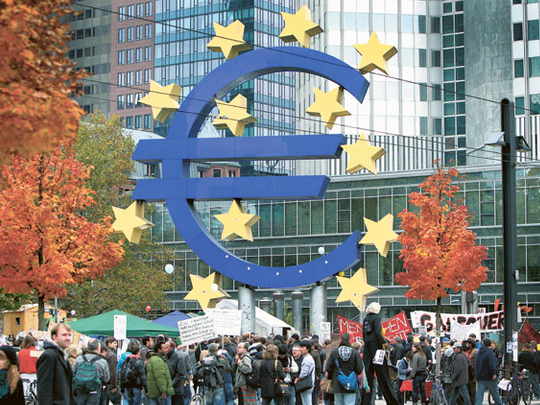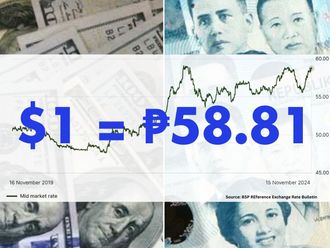
London: Central banks across five continents are undertaking the broadest reduction in borrowing costs since 2009 to avert a global economic slump stemming from Europe's sovereign-debt turmoil.
The US, the UK and nine other nations, along with the European Central Bank, have bolstered monetary stimulus in the past three months. Six more countries, including Mexico and Sweden, probably will cut benchmark interest rates by the end of March, JPMorgan Chase & Co. forecasts.
With national leaders unable to increase spending or cut taxes, policymakers, including Australia's Glenn Stevens and Israel's Stanley Fischer are seeking to cushion their economies from Europe's crisis and US unemployment stuck near 9 per cent. Brazil and India are among countries where easing or forgoing higher interest rates runs the risk of exacerbating inflation already higher than desired levels.
"We've seen central banks that were hawkish begin to turn dovish" against a "backdrop of austerity" in fiscal policy, said Eric Stein, who co-manages the $6.6 billion Eaton Vance Global Macro Absolute Return Fund in Boston. "You could debate how bad it will be for growth, but it can't be good," he said of the challenges facing the world economy.
Global rate
Monetary easing will push the average worldwide central bank interest rate, weighted for gross domestic product, to 1.79 per cent by next June from 2.16 per cent in September, the largest drop in two years, according to data and projections from JPMorgan, which tracks 31 central banks. The number of those banks loosening credit is the most since the third quarter of 2009, when 15 institutions cut rates, the data show.
Low short-term borrowing costs through at least the end of 2012 mean that "markets that provide reasonably good interest income should perform well," said James Kochan, chief fixed-income strategist at Wells Fargo Advantage Funds. High-yield corporate-bond mutual funds are attractive, as are government debt in "resource-rich" countries, including Australia and Norway, he said.
"There's a common theme almost throughout the world and that is either growth has been disappointingly slow or now it's slowing," said Kochan, who helps oversee $213.6 billion (Dh784.31 billion) and is based in Wisconsin. Europe's debt crisis "has a lot of central banks very concerned" because of its implications for exports from the US, China and other countries, he said.
While central banks in Australia and Indonesia have reduced borrowing costs and the Bank of Japan increased asset purchases in October, other countries in Asia may be slower to ease policy.
The People's Bank of China has raised its main interest rate three times this year to fight inflation. India's central bank lifted rates on October 25 by a quarter of a percentage point, while signalling it was nearing the end of its record cycle of increases as the economy cooled.
"Most central banks will wait and see how the situation develops in Europe," said Joseph Tan, Singapore-based chief economist for Asia at Credit Suisse Group AG's private-banking division.
"If we do have a continuation of the political impasse in Europe and that leads to a recession in Europe, and the US economy starts to slow again, then Asian central banks will cut interest rates."
The ECB under new President Mario Draghi is seeking to limit contagion in the 17-nation Eurozone as Greece's economic meltdown worsens. Investors are fleeing a group of sovereign bonds that's expanded to include those of Italy and France, driving up those nations' borrowing costs.
Yields on 10-year French debt increased to 3.69 per cent as of November 25 from 2.44 per cent in September. Italy's 10-year bond yields ended the week at 7.26 per cent, up from 4.52 per cent in February. German 10-year rates have declined to 2.26 per cent from 3.51 per cent in April even after Germany failed to get bids for 35 per cent of the 10-year bonds it offered November 23.
Slow growth
Draghi led the ECB's governing council in a 25 basis-point interest-rate cut on Novemebr 3, his third day in office, saying at a press conference in Frankfurt: "What we're observing now is slow growth, heading toward a mild recession."
Economists at Barclays Capital and JPMorgan Chase are among those predicting the ECB will cut its key rate another quarter-point this week, reversing the ECB's increases of April and July under former President Jean-Claude Trichet. They expect the benchmark then to be reduced to what would be a record low of 0.5 per cent in 2012.
Europe's turmoil has led Australia, Brazil, Denmark, Romania, Serbia, Israel, Indonesia, Georgia and Pakistan to reduce interest rates since late August. Chile, Mexico, Norway, Peru, Poland and Sweden are also forecast by JPMorgan Chase to lower borrowing costs by the end of the first quarter, while Australia, Brazil, Indonesia, Israel and Romania may cut rates further.
In the US, Federal Reserve Chairman Ben Bernanke is considering further actions to lower borrowing costs in the world's biggest economy.
- 9% - current unemployment rate in the US
- 1.79% - average global central bank rate, weighted for GDP
- 25 - point ECB rate cut likely in next week's meeting












